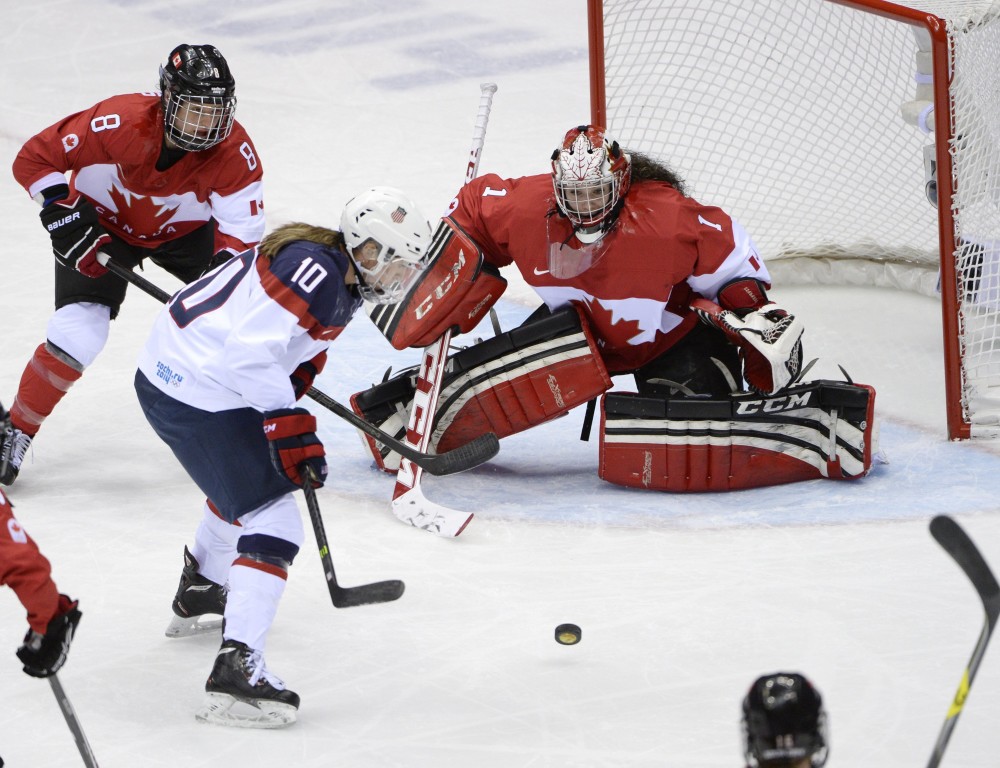By Justin Pelletier
Sun Journal, Lewiston, Maine.
Girls play hockey, too.
For the many advances we’ve made as a society in tolerance, acceptance and equity, so many of our stereotypes, ingrained in our being for generations, continue to pervade our everyday lives.
And before anyone thinks I am getting on my high horse, I will admit I am just as guilty as anyone else from time to time, though I will also trumpet the fact that I tend to catch myself if and when I do slip.
Last fall, my wife and I learned that our family was growing — exponentially. After waiting long enough to feel comfortable, we told our family and friends: Twins.
Two questions invariably surface almost immediately when someone finds out about a pregnancy: Are you going to find out the sex? And, what do you want them to be? (Or, what do you hope they are?)
That’s like a hockey player getting hit first by a pee-wee, and then by Milan Lucic at full steam.
The first one was simple for us: Of course we want to know. By nature, we are both planners, and not knowing would have driven us both bonkers.
The second question was loaded, and no matter the answer, there were myriad follow-up queries, the most predominant, given our employment (she a teacher and three-sport coach, I a sports editor), were related to sports.
“You must be hoping for at least one boy,” was a common statement, carrying on the family name being the primary reason.
Though also implied was the perceived father-son bond in the sports realm — taking junior to the ballpark, teaching him how to play catch, building a backyard rink and playing hockey as soon as he can walk.
My great-grandfather Pelletier was the only male in his generation of children. My grandfather was the only male of two, my father was an only child, as am I. This branch of the Pelletier family tree is now a twig, so I understand the sentiment of wanting to carry on the family name.
Understand, but honestly couldn’t care less.
It’s the other side to that series of questions that always leaves me shaking my head.
Of course I want to experience taking my children to ball games, playing catch in the yard, shooting free throws in the driveway, building them a backyard rink in the winter and perhaps even coaching their teams as they grow (though I’m still thinking that one over, and that’s a whole other column).
But I can do that whether they are boys or girls.
My love for the sport of ice hockey is well known, and the wisecracks began early.
“Two defensemen at a time, eh Justin?”
“Are you trying to grow a whole team?”
After revealing our twins are girls, the jokes remained, but shifted. Some to field hockey, some to soccer … many to cheerleading.
But why?
Girls play hockey, too.
The same reason you don’t find more than a handful of male cheerleaders statewide explains the small number of women’s ice hockey teams in Maine, and the lack of numbers on those teams at the high school level, even on teams that combine two schools’ populations: People have a natural stereotype, one that has survived shifts in tolerance, changes in laws and plenty of education.
For certain, things are much better 40-plus years after the passage of Title IX. Far better. And the number of women and girls participating in athletics continues to grow.
According to the Women’s Sports Foundation, in 1971, 1 in 27 girls participated in high school sports. In 2008, that figure was 1 in 2.4. For boys, the figure has remained constant at 1 in 2 for many years, though in 2008, boys’ participation reached 1 in 1.
buy kamagra oral jelly generic buy kamagra oral jelly online no prescription
7.
Nearly three weeks ago, one of the strongest women I know gave birth to two healthy baby girls, earning her place among those who can call today a holiday.
I am happy to know that my girls will grow up in a world that is far more tolerant of their eventual choice to participate in athletics (or any other endeavor) — regardless of the activity or their gender — than I did, and certainly more so than that in which our parents lived.
On this Mother’s Day, it is my hope that my daughters’ generation and that which is born when they become mothers themselves achieve total equality, in sports and in all facets of life.














































































































































































































































































































































































